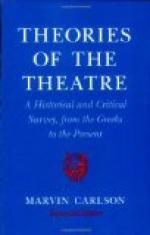We may now consider the significance of the three concluding phrases of the definition of a play which was offered at the outset of the present chapter. These phrases indicate the immanence of three influences by which the work of the playwright is constantly conditioned.
In the first place, by the fact that the dramatist is devising his story for the use of actors, he is definitely limited both in respect to the kind of characters he may create and in respect to the means he may employ in order to delineate them. In actual life we meet characters of two different classes, which (borrowing a pair of adjectives from the terminology of physics) we may denominate dynamic characters and static characters. But when an actor appears upon the stage, he wants to act; and the dramatist is therefore obliged to confine his attention to dynamic characters, and to exclude static characters almost entirely from the range of his creation. The essential trait of all dynamic characters is the preponderance within them of the element of will; and the persons of a play must therefore be people with active wills and emphatic intentions. When such people are brought into juxtaposition, there necessarily results a clash of contending desires and purposes; and by this fact we are led logically to the conclusion that the proper subject-matter of the drama is a struggle between contrasted human wills. The same conclusion, as we shall notice in the next chapter, may be reached logically by deduction from the natural demands of an assembled audience; and the subject will be discussed more fully during the course of our study of The Psychology of Theatre Audiences. At present it is sufficient for us to note that every great play that has ever been devised has presented some phase or other of this single, necessary theme,—a contention of individual human wills. An actor, moreover, is always more effective in scenes of emotion than in scenes of cold logic and calm reason; and the dramatist, therefore, is obliged to select as his leading figures people whose acts are motivated by emotion rather than by intellect. Aristotle, for example, would make a totally uninteresting figure if he were presented faithfully upon the stage. Who could imagine Darwin as the hero of a drama? Othello, on the other hand, is not at all a reasonable being; from first to last his intellect is “perplexed in the extreme.” His emotions are the motives for his acts; and in this he may be taken as the type of a dramatic character.
In the means of delineating the characters he has imagined, the dramatist, because he is writing for actors, is more narrowly restricted than the novelist. His people must constantly be doing something, and must therefore reveal themselves mainly through their acts. They may, of course, also be delineated through their way of saying things; but in the theatre the objective action is always more suggestive than the spoken word. We know Sherlock Holmes, in




